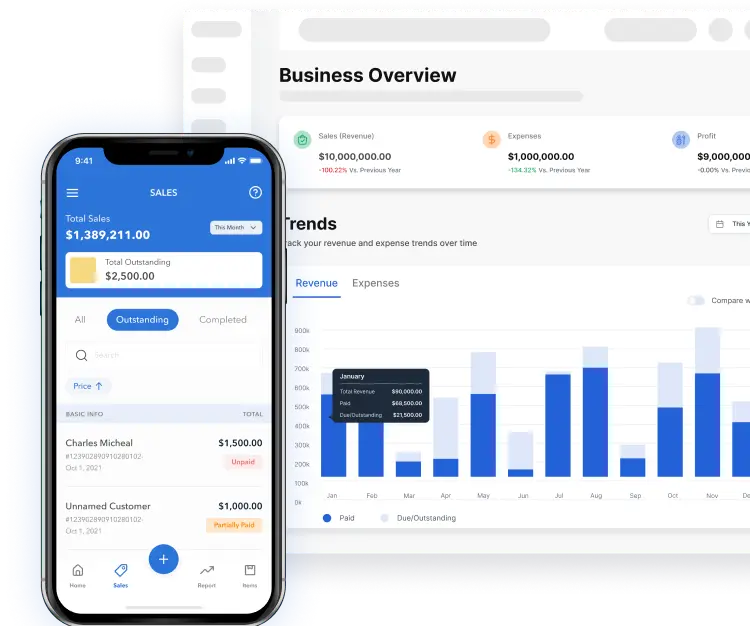Bookkeeping is a critical function in the world of business, ensuring that all financial transactions are recorded accurately and promptly. Whether managed by professional bookkeepers, accountants, or small business owners, the process plays a vital role in organizing financial data. This article walks you through the basics of bookkeeping and how you can enhance the process using accounting software.
Bookkeeping and Accounting

Bookkeeping and accounting are closely related, but they serve different purposes. Bookkeepers are responsible for recording transactions, and ensuring that the day-to-day financial data is accurately maintained. Experienced bookkeepers can also help close the books, prepare financial statements, and assist with tax preparation.
On the other hand, accountants take a more supervisory role. They review financial records, prepare more complex journal entries, and ensure the accuracy of financial statements such as the Balance Sheet, Income Statement, and Cash Flow Statement. Certified Public Accountant (CPA) firms are often brought in for audits or when financial statements are needed for investors or financing.
What’s the Difference Between an Accountant and a Bookkeeper?
The main difference between a bookkeeper and an accountant is the level of responsibility and expertise. Bookkeepers handle the day-to-day recording of financial transactions, keeping the business financially organized. Accountants, however, offer more advanced services such as financial analysis, tax consultation, and advisory on complex financial matters.
Bookkeeper’s Role in Your Business
While formal education isn’t mandatory for bookkeepers, they need to be precise and understand essential financial concepts. Their role often involves overseeing financial records under the supervision of an accountant or the business owner. Though they are critical to the business, bookkeepers can’t legally call themselves accountants without the necessary qualifications.
Accountant’s Role in Your Business
To be considered an accountant, an individual must have at least a bachelor’s degree in accounting or a related field like finance. Accountants can also earn additional certifications such as the CPA (Certified Public Accountant) designation, which requires passing a uniform exam and gaining experience in the field.
Closing the Books
Bookkeeping isn’t just about entering transactions; it also involves closing the books. The closing process ensures that all financial transactions for a specific period have been recorded, making it easier to generate accurate financial reports. One best practice is creating a detailed closing calendar that outlines the tasks, deadlines, and responsibilities for each financial period. This ensures accountability and a systematic approach to monthly and yearly closes.
Internal Controls in Bookkeeping
Establishing internal controls is vital to prevent fraud and maintain accurate financial records. These controls often involve separating duties between recording transactions and handling cash. For example, the person responsible for recording transactions shouldn’t be the one handling cash receipts or disbursements. If the business is too small to enforce this separation of duties, the business owner should regularly review cash receipts, vendor invoices, and bank reconciliations to catch potential errors.
The Accounting Period
The accounting period is the timeframe for which financial reports are generated. The Balance Sheet provides a snapshot of the company’s financial position at a specific date, while the Income Statement reflects transactions over a specific period, typically a year.
Businesses can choose between a calendar year (ending December 31) or a fiscal year that aligns with their operational cycles. This decision is important for reporting and tax purposes.
At the end of the year, Income Statement accounts are closed, with their balances transferred to the retained earnings account on the Balance Sheet. This ensures that the next year’s financial records only capture the transactions relevant to that year.
Comparable Financial Statements

Comparing financial statements from different periods helps businesses spot trends and make informed decisions. Financial statements can be prepared monthly or quarterly and compared to the same periods from the previous year. This process, known as comparative financial analysis, helps businesses evaluate performance and make necessary adjustments.
Double-Entry Bookkeeping
Double-entry bookkeeping is the foundation of accounting. Every transaction affects at least two accounts—one debit and one credit—ensuring the accounting equation (Assets = Liabilities + Equity) remains balanced. A chart of accounts, which categorizes each financial transaction, is used to properly record debits and credits.
Accrual vs. Cash Basis Accounting
There are two main methods of accounting: accrual basis and cash basis.
Accrual Basis Accounting
Accrual accounting records revenue when it is earned and expenses when they are incurred, regardless of when cash is exchanged. This method is preferred under Generally Accepted Accounting Principles (GAAP) because it provides a more accurate picture of a company’s financial health.
For example, if a company ships products in June but receives payment in July, the revenue is recorded in June under the accrual method.
Accrual accounting requires careful attention to cut-off dates. For instance, any transactions that occur after the accounting period must be included in the next period’s records, even if they relate to the previous period. This method helps businesses match revenues with related expenses, providing a more accurate view of profitability.
Cash Basis Accounting
Cash basis accounting, on the other hand, records transactions only when cash is received or paid. This method is simpler and may be suitable for small businesses that don’t have significant credit transactions. However, it can present a distorted view of the company’s financial health, as it doesn’t account for outstanding receivables or payables.
Account Reconciliations
To maintain accurate records, businesses must reconcile their accounts regularly. Reconciliation involves comparing the general ledger with other records like bank statements, accounts receivable, and accounts payable. Any discrepancies should be investigated and corrected promptly.
For example, reconciling the bank account ensures that the cash balance in the accounting system matches the bank’s records. Many accounting software systems offer automatic reconciliation features, making this process faster and more efficient.
The Role of Automated Accounting Software

The use of accounting software can dramatically improve the efficiency of bookkeeping. Automated systems handle tasks like posting transactions to the general ledger, generating financial reports, and even setting up recurring journal entries.
For example, when a company records a credit sale, the accounting software automatically updates the accounts receivable ledger and generates aging reports to track overdue payments. Similarly, automated systems can generate accounts payable reports, helping businesses manage outstanding bills.
Journal Entries
In bookkeeping, journal entries are used to record business transactions. These entries are typically posted to specific accounts in the general ledger. Many accounting software systems allow for automatic journal entries, which can simplify the recording of recurring transactions, such as monthly rent or depreciation expenses.
Deferred Revenue
Deferred revenue, also known as unearned revenue, refers to payments received for goods or services that haven’t yet been delivered. For example, if a customer pays in advance for a product that will be shipped next month, the payment is recorded as deferred revenue, a liability, until the goods or services are provided.
Once the obligation is fulfilled, the deferred revenue is recognized as earned revenue on the Income Statement.
Bank Reconciliations for Accuracy
Reconciliations aren’t just for accounts—they’re also critical for cash management. Bank reconciliations involve comparing the balance on the company’s books with the balance in its bank account. This ensures that all transactions have been accurately recorded and helps identify any discrepancies, such as unrecorded bank fees or unauthorized transactions.
Conclusion: The Importance of Bookkeeping
Bookkeeping is essential for maintaining accurate financial records, preparing for taxes, and making informed business decisions. Whether you’re a small business owner or working with a team of bookkeepers and accountants, understanding the basics of bookkeeping can help you ensure that your company remains financially healthy.
By using automated accounting software, businesses can streamline the bookkeeping process, reduce errors, and gain real-time insights into their financial performance. Whether you choose cash or accrual accounting, regular account reconciliations, and proper internal controls, maintaining accurate financial records will set your business up for long-term success.
Related Content






